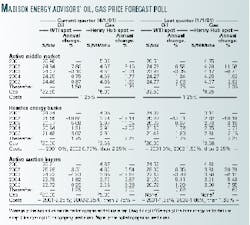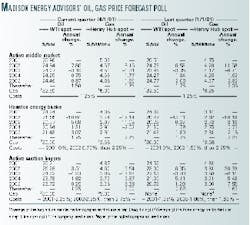Price expectations bolstered in Madison poll forecast
The Organization of Petroleum Exporting Countries delayed making any production changes during its June 5 meeting in Vienna, saying it will reassess crude inventories and market prices during a July 3 emergency meeting.
The wait-and-see approach comes after Iraq halted its oil exports to protest the United Nation's decision to extend its oil-for-aid program for only 1 month.
Iraq uncertainty
"We're all going to wait and see what Iraq does," Michael C. Lynch, chief energy economist at DRI-WEFA Inc., told OGJ Online last week. "OPEC is torn between inventories rising and concerns that supply could get tight."
OPEC's output quota as of Apr. 1 was 24.2 million b/d. Some analysts are predicting production hikes, although the timing remains uncertain.
Several OPEC representatives have indicated OPEC members are ready to make up any supply shortages as a result of Iraq's embargo. "I think they can come close enough that the market won't notice," Lynch said. "If the market were strong, it might be different, but the market is weakening." Demand has softened in Asia and Europe, he said.
OPEC issued a brief statement saying, "Stocks of both crude oil and products are at satisfactory levels...if present conditions continue, the balance presently observed in the market can be expected to continue until yearend."
UBS Warburg LLC contends OPEC has the spare capacity to replace Iraqi exports. The analyst estimates production from the 10 OPEC members excluding Iraq "to be 24.7 million b/d against capacity of 28.7 million b/d, giving estimated spare capacity of 4 million b/d, with all except Indonesia having some share of this."
Michael Rothman, senior energy market specialist with Merrill Lynch & Co., was in Vienna for the OPEC meeting.
"A production hike by the OPEC countries appears highly likely, but the real question facing the producer group boils down to when," he said. "Our sense is that ministers want to avoid making a hasty decision about adding oil volumes for fear of supplying too much crude too soon."
Rothman said a quota hike of up to 1.5 million b/d seems warranted, looking at projected inventory statistics for the last half of the year.
"If however, after July 3, we see the Iraq-UN stalemate become extended, OPEC faces having to address the 2.1-2.2 million b/d of lost exports. A combined quota hike of both these volumes would exhaust all but Saudi Arabia's spare production capacity," Rothman said.
Energy Security Analysis Inc. (ESAI), Boston, said it believes a production increase is likely later this summer.
"ESAI believes it is likely that OPEC will wait for the basket price to rise over $28/bbl for the requisite 20 trading days before officially sanctioning any production increase [per the price band mechanism]. In the meantime, if prices rise too high, ESAI feels it is likely that those OPEC members with spare capacity will quietly increase production, anyway."
The average price for OPEC's basket of seven crudes increased by 24¢ to $27.05/bbl June 4, shortly after the Iraqi export halt was announced, but it fell by 2¢ the next day.
The International Energy Agency in Paris is forecasting that world demand for oil will increase by 1.6 million b/d to a total 76.5 million b/d in the third quarter. Ali al-Naimi, Saudi Arabia's energy minister, has said that, if necessary, OPEC could by yearend restore the 2.5 million b/d of production that it cut earlier this year.
There is talk that Saudi officials have promised the administration of US President George W. Bush to do whatever it takes to avoid a major oil price spike, if US authorities will refrain from public arm-twisting to get OPEC to agree to an immediate increase.
Certainly, the Republican administration seems to have adopted a policy of quiet diplomacy with the oil cartel, despite pressure from Democratic members of Congress to push OPEC members to step up production.
For now, said Robert Morris, energy analyst at Salomon Smith Barney Inc., OPEC's strategy of increasing production during the periods of peak winter demand and cutting production during the early spring and summer slack seems to be working well by keeping oil prices within what that group claims is the best range for both producers and consumers.
Iraqi export halt
Iraq again halted its oil exports to protest the UN decision to extend its oil-for-aid program for only 1 month instead of the regular 6-month extension. It implemented a similar halt at the end of last November in another dispute with the UN-one that lasted about a month but had little effect on oil prices because of an ample inventory situation at the time.
UN officials said their proposed 1-month extension would give that organization time to study the so-called "smart sanctions" proposed by the US and UK that would modify the 1990 embargo of most of Iraq's oil exports. However, Iraqi officials said they need the full 6 months to ready oil contracts with buyers.
Amer Mohammed Rasheed, Iraq's oil minister, said the country would resume the bulk of its oil exports only with the regular 6-month renewal. However, he said oil deliveries by tanker trucks to Jordan and Turkey would continue, because those exports are not part of the UN program.
Iraq produces 3 million b/d of oil, of which some 2.1 million b/d is exported.
Added to the uncertainty over Iraq's future oil exports are concerns over supply disruptions in other key oil-exporting nations. OPEC member Indonesia is gripped with civil unrest surrounding possible breakaway provinces and the likely impeachment of embattled President Abdurrahman Wahid, and there is speculation over the prospect of worsening strife disrupting oil exports from the Southeast Asian nation. In addition, there are perpetual concerns over oil supply disruptions caused by civil disorder in Nigeria, Colombia, and Sudan.
Reassurances
OPEC's reassurances to the market came with a broadside at consuming nations' high petroleum tax levels contributing to consumers' high energy costs.
European Union officials said June 5 that they are concerned that Iraq temporarily suspended its oil exports but remain confident that other OPEC members would act to ensure stability of international oil markets.
However, in his remarks at the OPEC conference, Chakib Khelil, Algeria's energy minister and OPEC's conference president, complained of "excessive levels of fuel taxation" that are keeping product prices high "in many European countries." He said, "We call on these high-tax governments to review their distortionary fiscal policies."
In both the US and Europe, Khelil said, "The producer's share of the final consumer price is much diminished, to their obvious detriment. The inequity of all this is clear, particularly in the light of all our efforts to restore stability to the market at price levels that will neither trigger inflation in the consuming countries nor slow down global economic growth."
Moreover, he said, "It is worrying that this taxation is also being progressively applied to (natural) gas as well as oil products. Meanwhile, we are keeping a close eye on the liberalization of the gas markets in Europe and Asia, and the impact this could have on the oil market."

